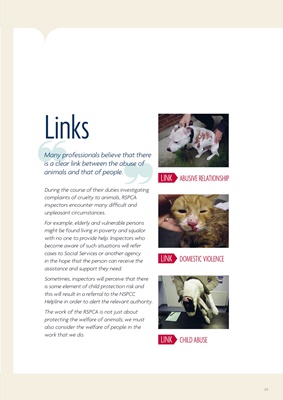
Investigating officer:
RSPCA Inspector Ian Burns
Defendant:
Female 23, unemployed
Offence:
Animal Welfare Act 2006 s4
Plea:
Guilty
Total convictions:
One
Sentence:
Disqualified from keeping
animals for seven years;
18-month conditional
discharge; £260 costs.
Prosecuted by:
Morgan Cole Solicitors
Investigating officer:
RSPCA Inspector
Suzanne Smith
Defendant:
Male 42, scrap metal dealer
Offences:
Animal Welfare Act 2006 s7
and s9
Pleas:
Guilty
Total convictions:
Four
Sentence:
Disqualified from keeping
horses for 10 years; 250 hours'
unpaid work, £1,000 costs.
Prosecuted by:
Nicholas Sutton Solicitors
WORCESTERSHIRE
PERSONS
CONVICTED 8
TOTAL
CONVICTIONS 25
A 16-year-old mare had been
grazed on a field that consisted
of 50-60 percent weeds. A vet
was called out and diagnosed the
horse with severe liver damage,
caused by ragwort ingestion.
Tragically, such was the extent of
the damage that she had to be
euthanased, on veterinary advice.
RSPCA Inspector Suzanne Smith
said: "Ragwort can result in an
extremely painful death. This
defendant said he knew of the
dangers of ragwort for horses, but
saw no problem in continuing to
let his horses graze on it."
Lee Hackett, Senior Executive
of the British Horse Society,
said: "We commend and fully
support the RSPCA in taking
this prosecution. Complying
with legislation should be one
motivating factor to encourage
people to remove ragwort, but
that pales into insignificance when
you consider the threat it poses
to horses."
WorcestershireA case in which a man was disqualified from keeping
horses for 10 years highlights the importance of
clearing ragwort from equine grazing land.
WILTSHIRE
PERSONS
CONVICTED 8
TOTAL
CONVICTIONS 12
WiltshireA lurcher-type dog, called Tink, was found in a
condition described by the inspector who found
her as the worst he had seen in 25 years.
RSPCA Inspector Ian Burns found
Tink barely alive, lying in urine and
faeces in a filthy flat strewn with
rubbish. He said: "I thought she
was dead until her eyes flickered.
I have never seen a dog in such a
terrible state that was still alive -
when I picked her up she was just
a bag of bones and skin."
Two further dogs were found
in a less severe, yet still
emaciated state.
Hospitalised at an RSPCA clinic,
Tink was given intravenous fluid
therapy and fed frequent small
meals. Within two days she was
able to stand by herself.
Tink gained weight, made a
miraculous recovery and now
has a new home. Pip and Patch,
the other dogs, also dramatically
improved and they too have been
successfully rehomed.
Tink when found (left)
and (above) after he recovered.
38PROSECUTIONS
Annual report OUR FRONTLINE WORK
2014